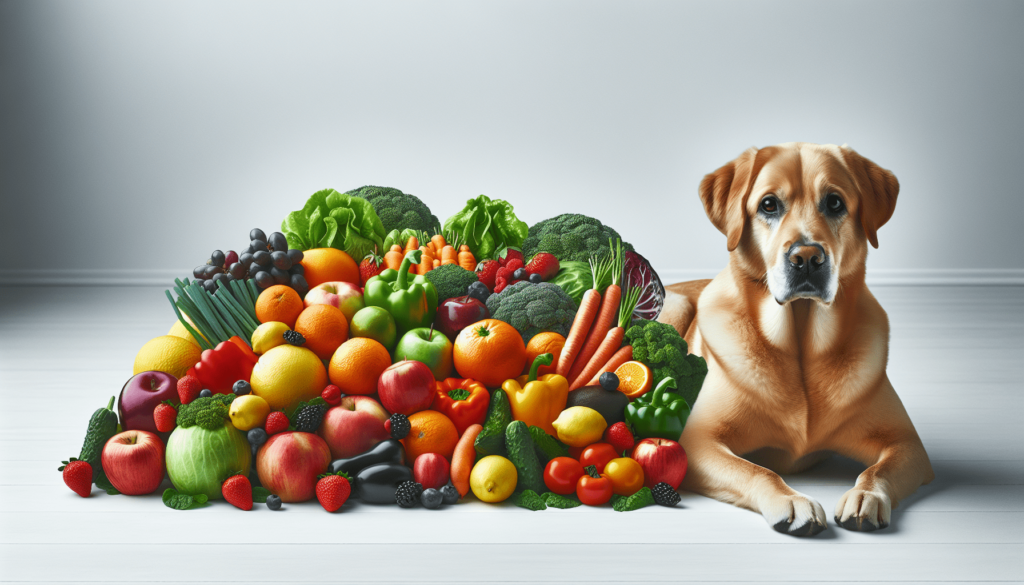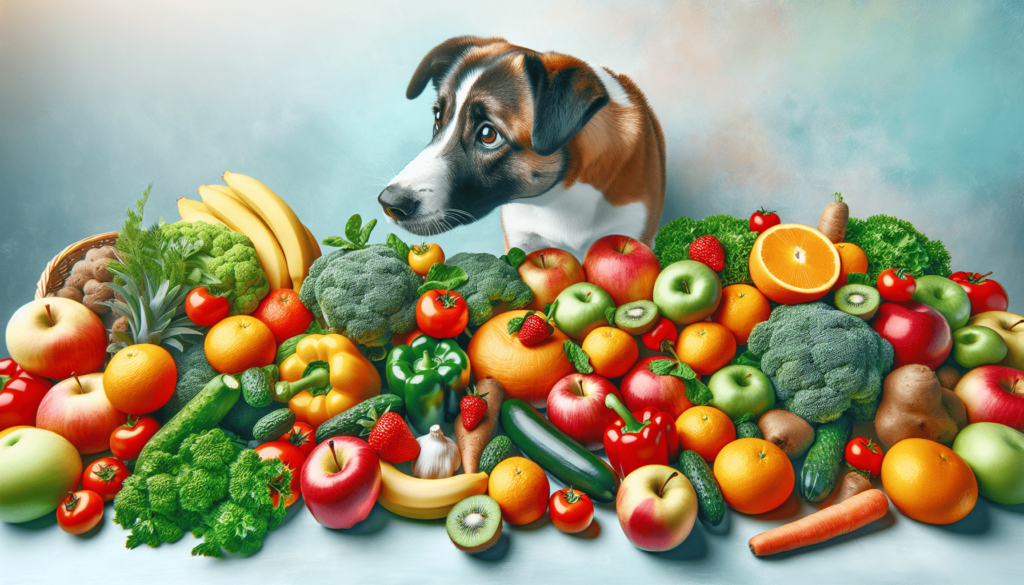Have you ever wondered, “Can dogs eat fruits and vegetables?” It’s a question that might cross your mind as you watch your furry friend eyeing that juicy apple or crisp carrot you’re about to bite into. As a dog lover, I often find myself curious about what constitutes a safe and healthy diet for my canine companions. Just like humans, dogs can benefit from a variety of nutrients, but not all fruits and vegetables are safe for them. Let’s dive into this topic and discover which fruits and vegetables are best for dogs, and which ones to avoid.

Can Dogs Eat Fruits and Vegetables?
Absolutely, dogs can eat certain fruits and vegetables and gain nutritional benefits from them. However, it’s important to remember that not all fruits and veggies are dog-friendly. Incorporating the right produce into your dog’s diet can provide essential vitamins, minerals, and fiber. But we must tread carefully as some fruits and vegetables can be toxic for them. As a responsible pet owner, knowing which options are safe is crucial.
Why Include Fruits and Vegetables in a Dog’s Diet?
Including fruits and vegetables in your dog’s diet contributes numerous health benefits. Just like humans, dogs can enjoy a more balanced diet with the help of plant-based foods. These benefits include improved digestion thanks to fiber content, stronger immunity due to vitamins and antioxidants, and even weight management with low-calorie snacks. My dog, for instance, has thrived after I started adding a few dog-safe fruits and veggies to her meals, becoming more active and lively.
Fruits that Dogs Can Safely Eat
Apples
Apples are a great choice for dogs, provided you remove the seeds and core. This fruit is a fantastic source of vitamins A and C, and its fiber content can aid digestion. I tend to offer my dog apple slices as a refreshing treat on warm days.
Blueberries
These small berries are packed with antioxidants, which are excellent for a dog’s immune system. Additionally, they are low in calories, making them a perfect treat for those keeping an eye on their dog’s weight.
Watermelon
Watermelon is another safe option, but it’s important to remove the rind and seeds. Rich in vitamins A, B6, and C, this fruit is also hydrating due to its high water content. During summer, my dog loves munching on watermelon cubes to cool down.
Bananas
Bananas are rich in potassium and provide a quick energy boost. They are great as an occasional treat but should be given in moderation because of their sugar content. I sometimes mash up a bit of banana to mix with my dog’s usual food.
Vegetables that Dogs Can Safely Eat
Carrots
Carrots are a favorite for many dogs because of their crunchiness and sweetness. They provide vitamin A and are excellent for maintaining good eye health. I often use carrot sticks as a healthier alternative to traditional dog treats.
Green Beans
These are loaded with fiber and low in calories. Green beans can help dogs feel full while being part of a weight management plan. I find my dog enjoys them as a crunchy, satisfying snack.
Sweet Potatoes
Sweet potatoes are rich in vitamins like B6 and C, along with beta carotene. They can be served cooked and mashed or sliced into chews for a nourishing treat.
Broccoli
Broccoli contains plenty of fiber and vitamin C, but it should be given in small amounts due to the risk of upsetting a dog’s stomach. I usually steam a little broccoli and offer it as a side with my dog’s dinner.
Fruits and Vegetables to Avoid
Unfortunately, not all fruits and vegetables are safe for dogs. Some can cause health issues or even be toxic.
Grapes and Raisins
These are highly toxic to dogs and can lead to kidney failure. It’s vital to keep grapes and raisins completely out of reach from your pets.
Avocados
Avocados contain persin, which can be harmful to dogs in large amounts. While a small quantity may not cause immediate harm, it’s best avoided to prevent any risks.
Onions and Garlic
Both onions and garlic can wreak havoc on a dog’s red blood cells and lead to serious health problems. Even small amounts could be hazardous, so they should be avoided at all costs.
Cherries
The pits in cherries contain cyanide, which is dangerous to dogs. The flesh is safe, but it’s better to avoid cherries to prevent accidental ingestion of the pits.
Tips for Introducing Fruits and Vegetables to Your Dog’s Diet
When introducing new foods to a dog’s diet, it’s essential to do so gradually. Sudden changes can lead to upset stomachs or allergies. Observe how your dog reacts to each new fruit or veggie, looking out for any unusual behavior or symptoms. Here’s a tip I follow: I start with small portions and introduce one new item at a time. This way, I can easily identify any problematic foods.
The Perfect Balance: Fruits, Vegetables, and Regular Dog Food
While fruits and vegetables can be beneficial, they should not replace a complete and balanced diet. Commercial dog food is typically formulated to meet all of a dog’s nutritional needs. Fruits and vegetables serve as supplements and treats. For instance, I often use them as rewards for good behavior or as a snack between meals. Always seek advice from your vet to create a diet plan tailored specifically to your dog’s needs.
Common Questions about Dogs and Produce
Have more questions about which fruits and vegetables are safe for dogs? Here are some frequently asked questions that might help clear up any uncertainties.
Can dogs eat oranges?
In moderation, yes! Oranges are a good source of vitamin C and can be a sweet treat. Just be sure to remove all seeds and peeled skin before offering slices to your dog.
Can dogs eat tomatoes?
While ripe tomatoes are generally safe, the green parts of the plant contain a substance called solanine, which can be harmful. It’s best to avoid tomatoes unless you can ensure it’s ripe and free of stems and leaves.
Can dogs eat spinach?
Spinach contains oxalates, which can affect calcium absorption and cause kidney issues in large quantities. Therefore, it should only be given occasionally and in small portions.
Conclusion
Understanding which fruits and vegetables are suitable for canine consumption is essential for maintaining your dog’s health and well-being. Incorporate safe options into their diet to offer variety and nutritional benefits, but always with due caution. I encourage you to try adding a few of these recommended fruits and veggies as treats for your canine friend and watch them enjoy the refreshing change. Remember, a healthy dog is a happy dog!

FAQ
Can dogs eat apples? Yes, dogs can eat apples, but make sure to remove the seeds and core.
Are grapes safe for dogs? No, grapes and raisins are toxic to dogs and should be avoided.
Is broccoli good for dogs? In moderate amounts, broccoli can be beneficial but should not make up a significant portion of their diet.
Can dogs have avocados? Avocados should be avoided as they contain persin, which is potentially harmful to dogs.
By following these guidelines, you can safely integrate fruits and vegetables into your dog’s diet, enhancing their health and keeping them energized and joyful.



